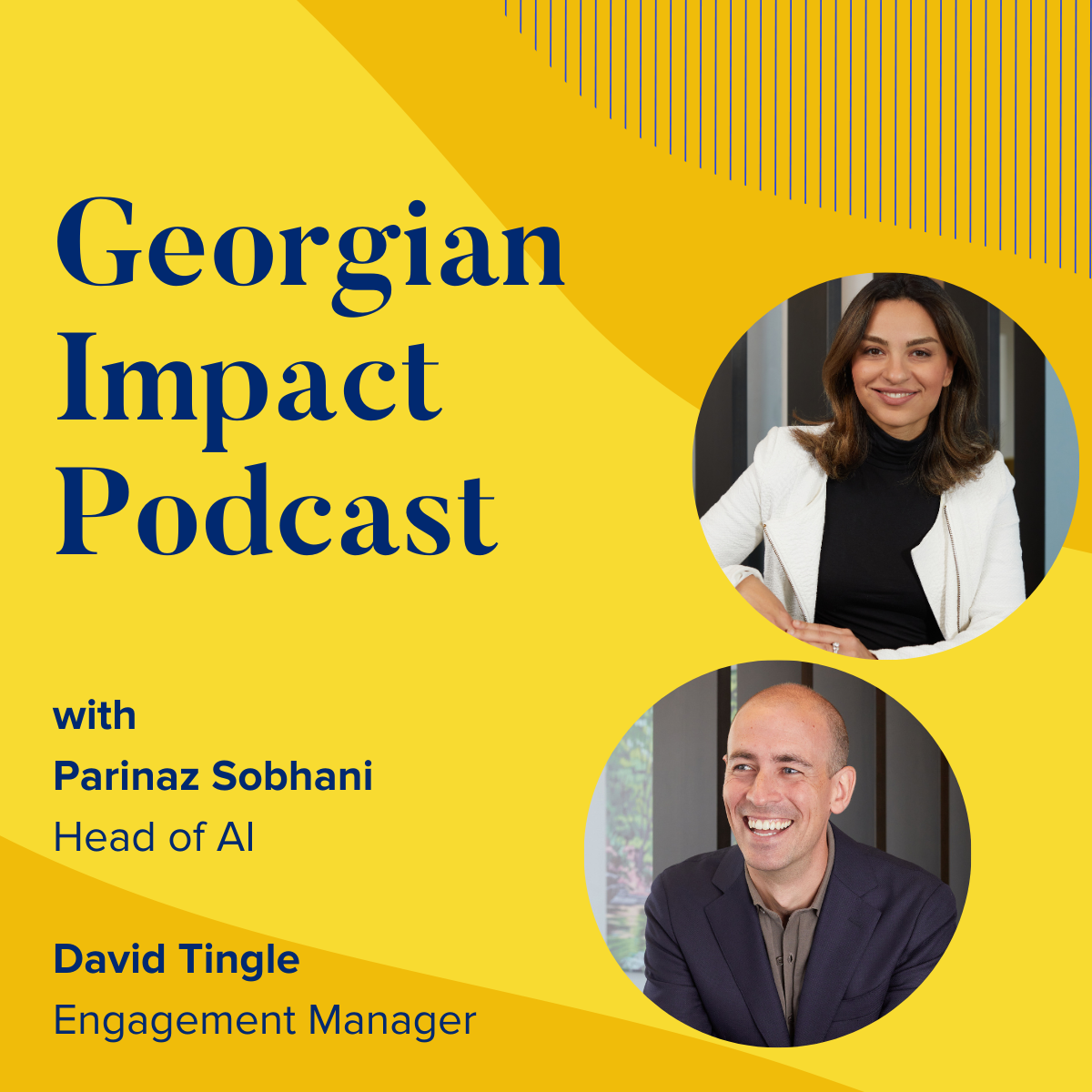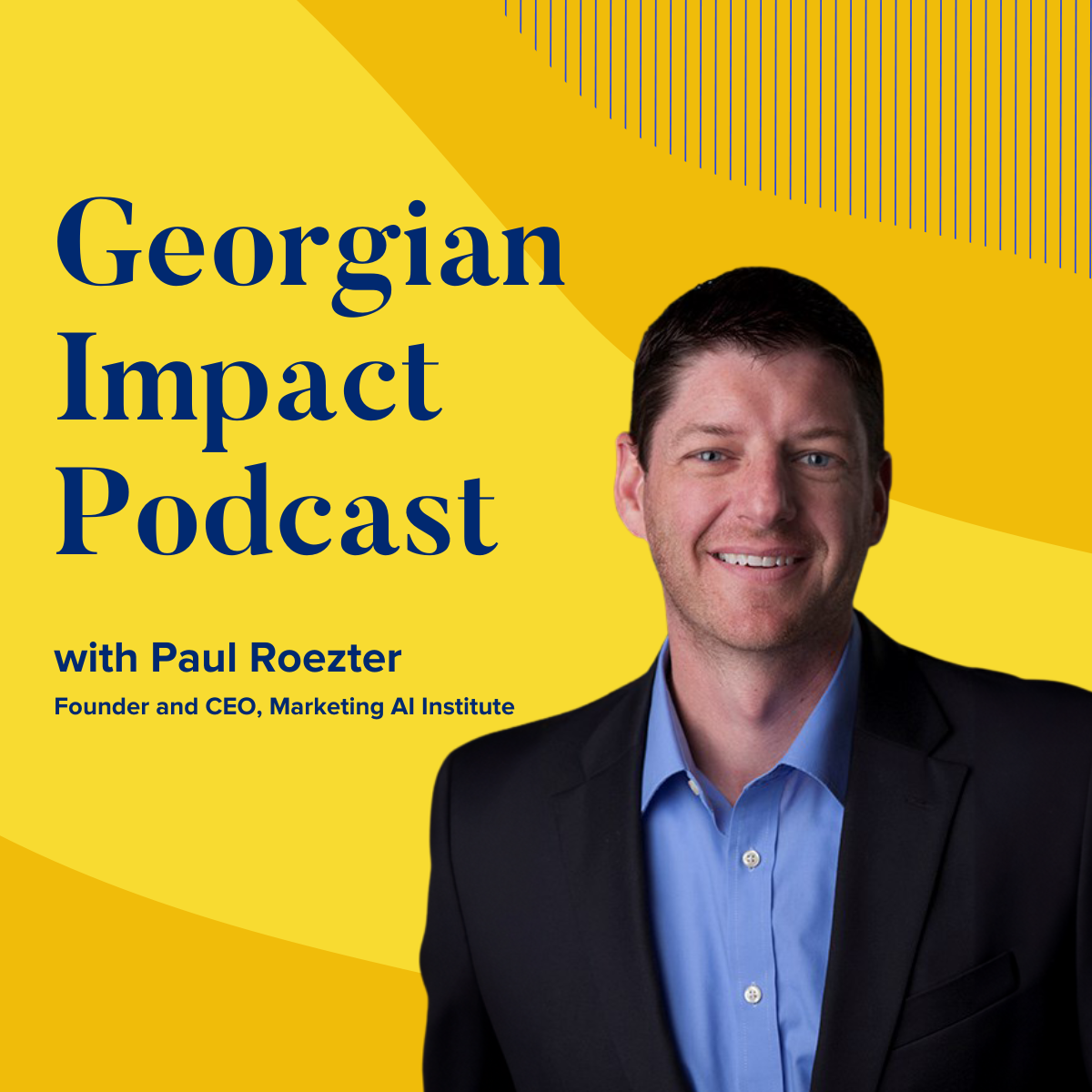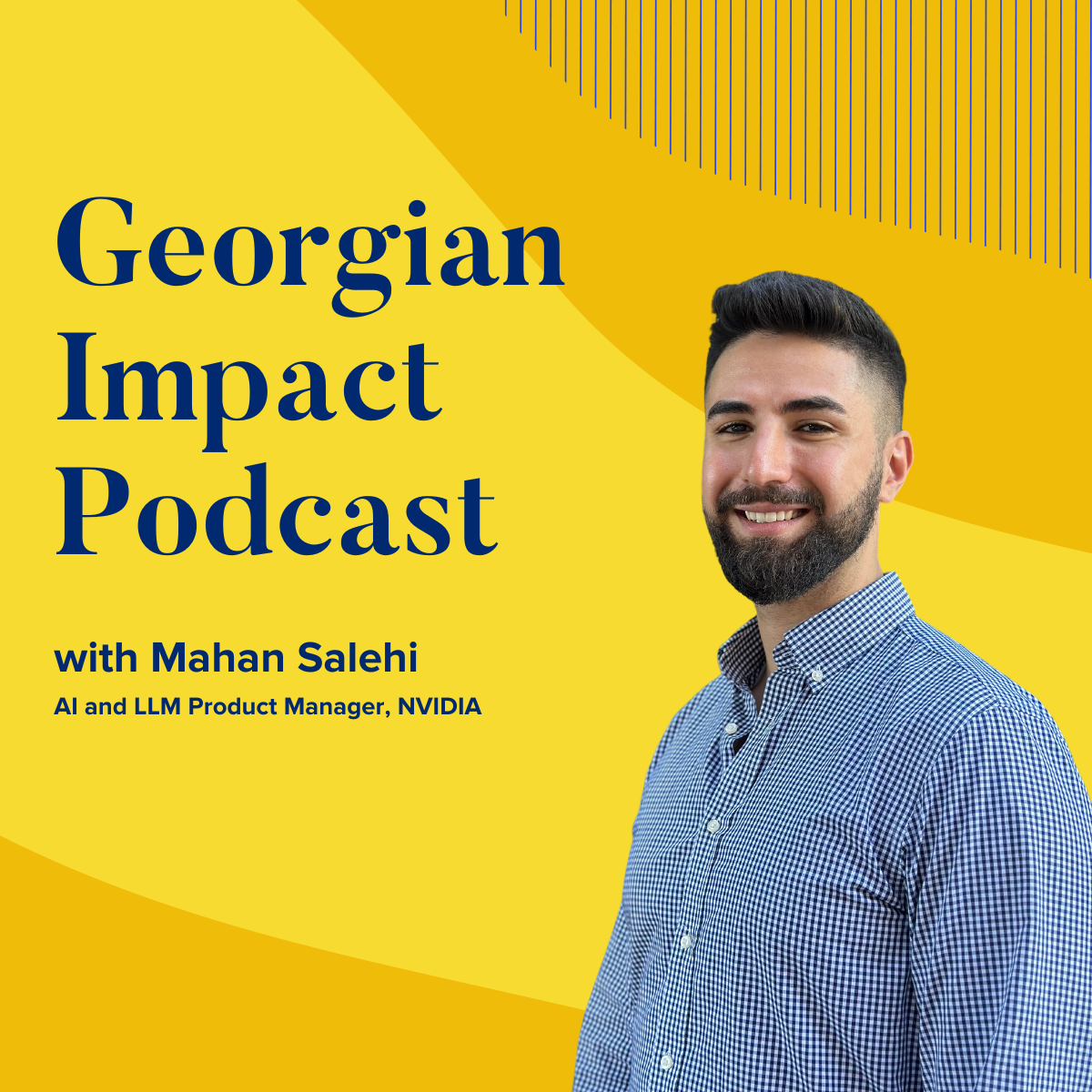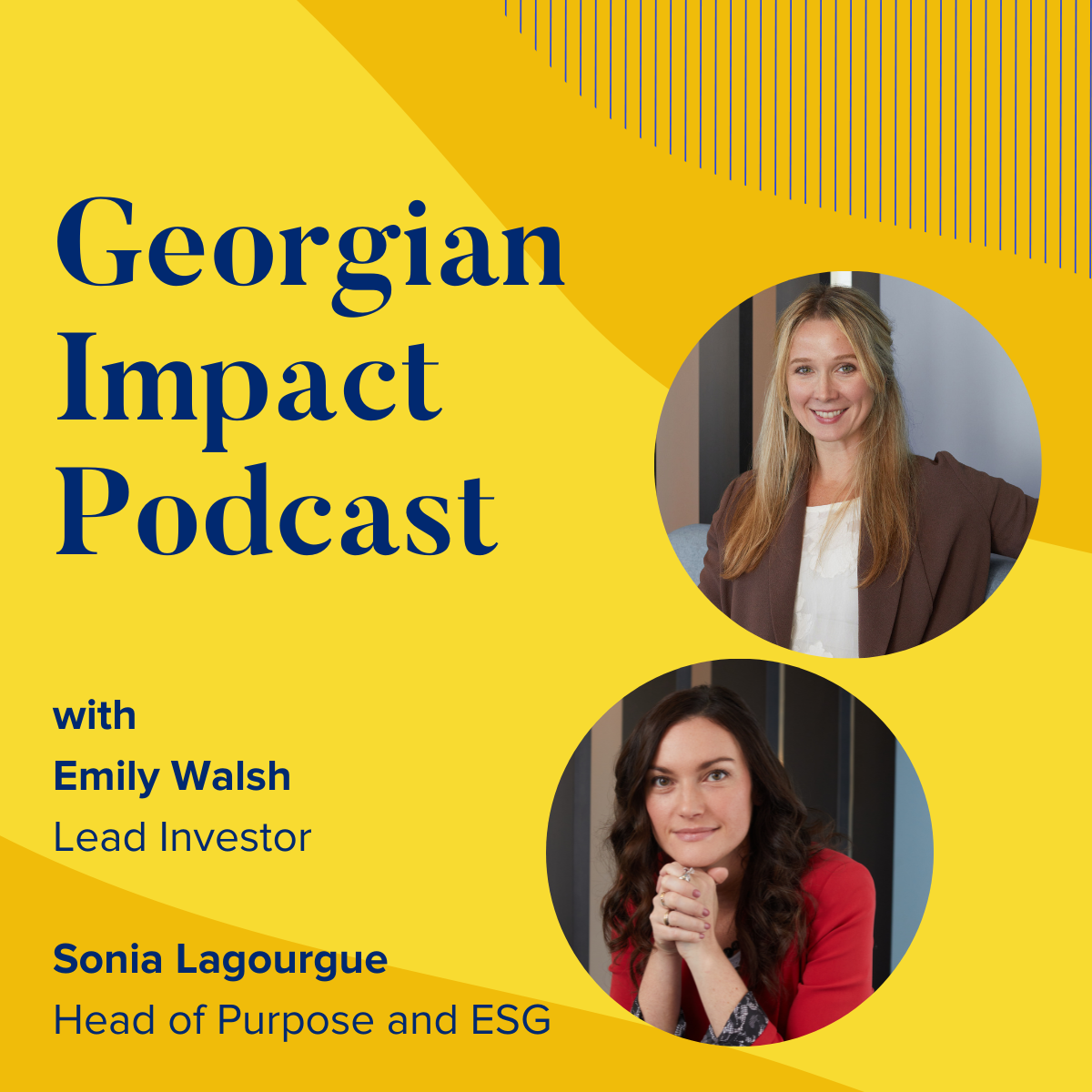Episode 88: The TWIML & AI CEO’s Guide to Machine Learning and AI with Sam Charrington
- 0.5
- 1
- 1.25
- 1.5
- 1.75
- 2
If you're a fan of our show that you might also like another podcast twiml AI That's this week in machine learning and artificial intelligence. It's perfect anyone looking for a deep dive into every conceivable corner of ML and AI deep learning and transfer learning or what makes bitter Secret's models and intelligent automation possible. That's the tip of the iceberg the homestead man behind this week in machine learning and AI to the show. I'm going to be turning the tables on Sam and putting him in the hot seat as I pick his brain by the insides and trained he's gleaned from interviewing more than 150 the top ML and AI expert in the world. Don't go anywhere. I'm John Prine hello and welcome to the Georgian impact podcast.
Welcome to the show. What a pleasure to talk with you. Awesome. Thanks John. It's great to be on the show me a bit more about your background and how you end up revolving product to to journalism in war say it's funny people will occasionally refer to me as a journalist and it always freaks me out. But I know some folks who you know who gone to school for that and it's just it's weird. I actually I've got a couple of engineering degrees both in electrical engineering my first exposure to a i in fact was picking up a book on a Bargain Bin when I was in grad school at Northwestern prospere and that kind of laid dormant until six years ago. I left the startup. I was at where I was running product management marketing and started this kind of industry research firm with the division of you just seemed really clearly that Enterprises were being presented with so much data.
We need a new set of tools in order to intelligently use that and so I started focusing on both kind of what we're at that time more established Technologies, like cloud and big data but also machine learning platforms and Frameworks and to look at sent in that kind of stuff and I've been kind of neck deep in that ever since indeed. And actually I referred you do more than journalism. And it's this or that you've been a principal analyst that cloud plus strategies and you are advising businesses and Technology leaders on these pieces, and I think we'll try to use some of that as we pick your brain this morning. You're trying to Talk podcast. If I did my math, right you're well over a million and a half listen to you're always on the top 10 list of ML and AI podcast that you clearly have found the needs and and you serve it. Well as a graduation gift, thank you. So as you look back over the past, it's more than a hundred fifty podcast know what you think supposed to prising or insightful earnings that you come across a man.
How much happening in the space? It's incredible that changes in a day-to-day, you know that the thing that I come back to often is trying to stay grounded a kind of straddle these two worlds. If you will I'm talking to researchers that are way ahead and kind of the the research and and application machine learning and AI but kind of fundamentally I tend to think a lot about you know, what traditional Enterprises are doing and what they need and within that ladder crowd it's you know, they got a ton of value out of very very simple techniques for the application of relatively simple technique. So, you know while on the one hand I get excited about things like reinforcement learning reinforcement learning is a technique that is on The Cutting Edge of the closest. We have to teach in computers how to learn the way humans learn but at the same time for a Moe's
Enterprise's you're not there yet there, you know, they could get a ton of value just by you no more judiciously applying simple techniques life regression. So, you know figuring out how much are in and you know, this rather pedestrian use cases what a perfect setup cuz I was thinking about how I want to kind of talk to you about Trends and and you often do drill down to get amazing explanations of how much of the leading at Cactus out there an ML and AI but if I walk if you buy short and sweet definition with my Enterprise had on obviously, they're starting with data, they're collecting more and more data. They're analyzing it and they're flying techniques and it's machine learning techniques and it's evolving to AI techniques. We're not going to get into the definitions and debates over what those terms mean. But if we think about the front end, you're just getting that data you get the sense that companies recognize the challenge and are still focusing on making sure that data to have his right and that they're leveraging the two.
Correctly or are they moving beyond that that where are there? That's than that evolutionary stage. It depends a lot on the the type of Enterprise. The the technology companies are a lot further along with the traditional Enterprises. I tend to find that you know, most of them jumped on the The Big Data wave 7 10 years ago and just started collecting collecting collecting collecting and so part of their challenge is rationalizing and kind of figuring out these different silos that they've established and you're dealing with issues of data quality and data cleansing things like that because fundamentally and I think the background to your question is the recognition of fundamentally to do anything with machine learning and AI you've got to have your data house in order right you you've got to be able to access data that helps you use it to to solve the given problem and
If a lot of Enterprises the date is there but it's gaining easy access to it. That's a challenge. So, you know you often talk to data scientists and their experiences that they spend 10% of their time doing kind of fancy modeling and all the stuff that we think of them. We think of data science and 89% of their time, you know, just wrangling data getting it from one place to another getting it out of one place at and cleansing. It's in dealing with data quality issues things like that. So there's a ton of of work that companies, you know end up doing laying in that space in order to take advantage of a by Melanie. I from the product teams that are kind of bringing the end user needs and the company's strategy down to these Tech Team sitting in those dark room somewhere. Yeah. I think she know if if you know, we start talking about technology companies, I think you know, I think they
How to be a bit further along in the maturity curve so, you know, they've got the advantage often times of being you know, Quantico born on the web or born in the cloud and yeah, they're often solving now we're problems and so, you know, they've got most of the data that they need or much of the data that they need and in one place and where the product team comes in is really helping the very narrowly and and clearly Define the problem that they are trying to solve with ML and AI because one of the worst things that you can do is go after ML and AI for its own sake I think there's a place for that particular for large Enterprises often advise folks to kind of know for sure. So close down the mlna I pass because it's just going to be such a critical technology that you don't want to be caught flat-footed. So, you know for sure self to find some problems to say
I'll even after Troy problems about four tech companies, you know that the product teams role is to really identify ways to create user value with machine learning in the eye and then you know in doing so and then constraining the role of the ML and AI projects that gives the technology teams really the the boundaries that they need to move quickly and I love the point in as you know, we were very focused and this is kind of really the last step of the evolutionary journey. I was talking about earlier. They now have the predictions in the tools and they've got a data in in order and we want to see this work apply to a business process of creating a new business process Improvement a business process the application of a I applied AI what's your sense of where companies are on on that part of the curb? Are they are they getting close? So you think men are there across kind of the spectrum Industries you see ya generally.
Do I think of the market maturity broadly is that for traditional Enterprises large companies most of them over the past five or so years have been on this path of picking, you know, some proofs of concept some start a project technical toe dips and really running those through the paces and we're over the past year or so in a really starting to see the successes there. And so now moving into a phase where they are working too kind of build out there, you know, their process sees their technology platforms so that they can scale these machine learning efforts more broadly. It's a bit you made me think about it wasn't that many podcast to go. You wasn't talkin to Capital One and you talk about how to get started with a evolve so I thought it was interesting because
There are some things that are you maybe along the line of the Drone or something simple. I guess I'm being naive and going a simple by weathers fraud detection money laundering, but eventually we're all going to get to get an automated back office processing or seeing lots of robotic process automation. They're getting big booster. May I so I think we have to help them all understand their Journey. Each Industries company is going to be on a different rate and paste on this journey right now. That's that's definitely that the case because I think a lot about platform Technologies. I tend to think of first the kind of ML and AI applications and tools that companies are building and customizing heavily for their own uses, but it's also important to recognize that a lot of
Enterprise exposure to ml and AI is going to come via vendors startups other technology suppliers kind of baking ML and AI into their own offerings. And so for those vendor is it it's it's going to be key to to take advantage of machine learning to make the product smarter because their customers are going to ultimately expect that. So we're hoping that you obviously the CEOs are going to guide their staff and and bring forward the leadership for the right product of the right market and satisfying the customer is a pharmacy tech teams have a lot to learn but he said they going to keep listening to you to you as well. Do you think the at the end of the day the base platform is whether it's something offered by a Facebook or an Amazon or IBM Watson or any of these larger vendors do they become more or less relevant overtime and there's some interesting questions there including the ability to create.
Generalizable AI platform platforms or something that I've always been, you know, very excited about whether we're talking about Cloud big data analytics AI but often there is just Last Mile problem when it comes to building out machine learning and AI applications meaning you can kind of do some broad sayings with general-purpose Technologies, but to really solve the specific problem that you have, you know, you've got to be training on your data as opposed to some dataset providers provided and use you've got to have some flexibility to be able to manipulate that data and and often manipulate the the training processing and modeling process. And so, you know, I'm in a very optimistic that we'll get there and that companies will kind of find broad value in machine learning platforms that exist and kind of this middlebrow.
Between low-level Frameworks, like you're tenser Flows In Your Pie torches and high-level AI as a service offerings like all the club vendors provide, you know, your IBM Watson senior your various cognitive services, but you know, there's still work to be done there. I like the analogy and going to call at The Last Mile and we kind of make an assumption often that every company we talked to his building data science teams, and they were already there and maybe some to read large large company that like, it's probably not true across the entire spectrum of the tech industry leveraging the sudden your analogy holds really well. They going to have to yell figure out what tools to use but they're going to have to make it work for them. Right because I had to figure out what what their Solutions going to be pick the right technology, but then own it outright, and I know you are excited to talk to you.
Casper of I was excited that you should check but I think there's a lot of been taking for granted that you just this is the old Tech idea just throw the data into the email system Technologies going to work at a give you the answer is life was good. And it's very clear. Now, we're turning this very interesting Corner around trust and bias and I'd really love to hear your views on how this is going to become important over the next days weeks months years, right?
Yeah, it's it's it's critical. And in fact, we're pulling together a i and ethics series of podcast to really explore this a lot further, but I think the the quote that most exemplifies the challenge for me comes from an interview that I did with moustapha cisse who was a research scientist at Facebook AI research until very recently. It was announced last week. I think it was announced that he would be leading up a new Research Center in Ghana for Google AI working with Jeff Dean and and the podcast she said that the podcast I did with them not too long ago. He said that
Yeah, that the data that we feed our models is you know, it's essentially food Brighton and you are what you eat. And right now we are off and feeding our models junk food, right? That's the problem and you know, there's a lot that needs to be done. It's imperative for organizations to really understand this idea that data is inherently biased so, you know, I'm not positive or negative is just there are they all data has biases and what machine learning models do is figure out those patterns, which are those black does biases and make decisions based on them. And so if you don't understand the biases that are inherent in your training data sets, you can understand the behavior of your models. And so there's a lot of activity happening now around trying to create tools to help companies, you know understands their data. I was just reading earlier about a Facebook project.
Let the any kind of an internal platform that they've built call fairness flow that helps their developers understands our and buy us some Microsoft research postdoc. Tim Gabrielle is done some work on you proposing that books are published data sets or collect data sets create data sheets kind of like traditional engineering data sheets about their data sets that prop the the folks that have training needs datasets to think about and write about the biases that may be inherent in them. And so I think it's only in really understanding these, you know, these biases and data would create biases and model behaviors that will be able to get to a point. Where were able to trust the decisions that these models are recommending for us. That's a great story on the tech side and I'm encouraged on the on the non text side, you know, whether it's Cathy O'Neil getting weapons of math destruction going.
More mainstream that at that a checkbook. Yeah, we're getting more recognition of bias being more than what we typically think of and read the page one of every paper on people's biases wishing recognition of cognitive bias that we humans are making decisions based on what they want the answer to be not what they are facing on facts that also I think when the to get merged together, I think it'll help everybody kind of together recognize that everything needs to move forward and whether it's at the tech side or on the human side, we're going to hopefully get through this in a in a better way come out or not hold better shape of society and Technology. Why do this but I don't think we can see you again. Thanks for taking the time with us. Great to see you John and I appreciate the opportunity to be on the show.
Thanks for listening if you like what we doing, we'd appreciate your telling other people about the show better yet. Give us a 5-star rating on iTunes or write a review doing so will really help ensure the more people can find us and if you haven't already please subscribe to the impact podcast on iTunes, SoundCloud or have you go to find your podcast.








